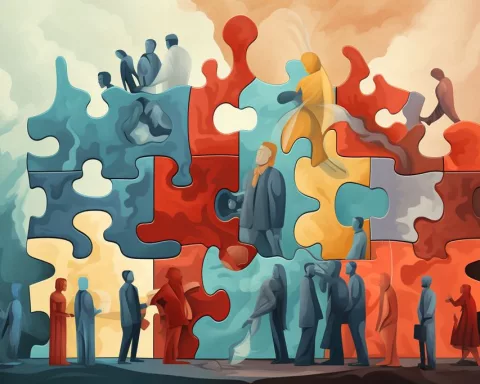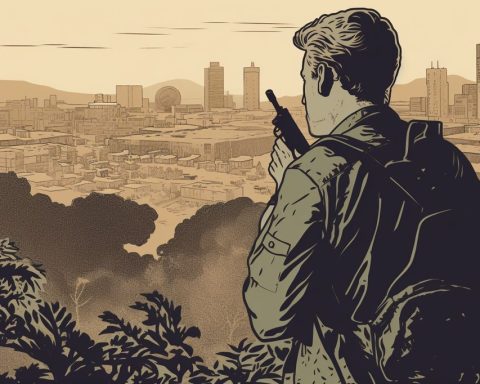The MK-ATM alliance is a powerful partnership in South Africa, bringing together the MK Party and the African Transformation Movement to fight for the rights of marginalized communities. Like the heroes of the anti-apartheid struggle, these groups are rallying together to inspire change as they prepare for the 2026 elections. Their unity symbolizes hope and determination, calling on all South Africans to join in for a brighter, fairer future. This alliance is not just about politics; it’s about creating a new path where everyone can thrive together.
What is the significance of the MK-ATM alliance in South Africa’s political landscape?
The MK-ATM alliance is crucial for South Africa’s political future, aiming to unite marginalized communities through collaborative efforts. This partnership, reminiscent of historical anti-apartheid movements, seeks to inspire collective action and drive progressive change leading up to the 2026 local government elections.
A Unifying Alliance for Change
South Africa’s dynamic political environment has seen the emergence of a significant coalition between two influential entities: the UMkhonto weSizwe (MK) Party and the African Transformation Movement (ATM). This partnership is set to steer through the complexities of the 2026 local government elections. By joining forces, these parties aim to further the emancipation of South Africa’s historically marginalized and oppressed populations. Such alliances mirror the collaborative spirit seen during pivotal historical moments, like the anti-apartheid movement, where unity among diverse groups was instrumental in achieving monumental progress.
The recent union of the MK Party, led by Jacob Zuma, and the ATM, under the leadership of Vuyo Zungula, marks a strategic alignment. On March 5th, their representatives met in Durban to deliberate on their shared values, principles, and objectives. Their joint statement delivered a clear message: the struggle for complete liberation of South Africa’s marginalized communities is far from over. This sentiment draws from the ideological currents of 20th-century liberation movements, where collective action was essential for meaningful change.
In their joint declaration, the MK Party and ATM asserted that the fight for the total emancipation of South Africa’s oppressed people requires a unified approach and common action. This statement serves as a fervent call to arms for all progressive factions, evoking the spirit of past struggle icons. The consensus reached by these parties reflects not just a political maneuver but a profound commitment to a shared cause.
Beyond Rhetoric: Strategic Planning for Future Elections
The MK-ATM alliance goes beyond mere rhetoric. During their meeting, they mandated the secretary-generals of both parties to convene a smaller, focused group. This task force will meticulously design the operational framework for their collaboration in upcoming by-elections, with a clear eye on the 2026 local government elections and the 2029 general elections. The modalities of this partnership will be carefully crafted and presented to the leadership and membership of both parties, fostering a spirit of unity among South Africa’s progressive forces.
The historical significance of this alliance is immense. Alliances have often played a crucial role in South Africa’s political history, serving as the keystone for revolutionary change. For instance, diverse groups united under a singular banner during the anti-apartheid struggle to push for a common goal. The MK-ATM alliance seeks to rejuvenate this spirit, emphasizing unity among all progressive forces in South Africa. They urge other political formations and individuals to join their cause, echoing the revolutionary fervor of bygone eras where unity and collective action were not just strategies but imperatives.
Parallel to this development, ActionSA formed a pact with the Forum 4 Service Delivery (F4SD) in January. ActionSA leader Herman Mashaba articulated the rationale behind this alliance, stressing the need for opposition parties to consolidate their efforts. This coalition aims to build a robust alternative, garnering the support of South Africans disillusioned by the current political establishment. In a political landscape where 70% of parliamentary seats form part of the Government of National Unity (GNU), the creation of the self-styled ‘progressive caucus’ emerges as a counterbalance.
The Role of ActionSA and F4SD in the Political Landscape
The Senate of ActionSA solidified this partnership by amending the party’s interim constitution to establish the position of Deputy President, a role now occupied by F4SD leader Mbahare Kekana. Mashaba envisions more than just political gains; he recognizes the intrinsic value that F4SD brings to the alliance. Their grassroots engagement, particularly within rural communities, stands as a testament to their efficacy despite limited resources. Thus, this partnership is not just a political alliance but a convergence of capabilities aimed at forging a resilient alternative to the prevailing political order.
Drawing a parallel with historical and artistic movements, these political alliances can be likened to the collaborative spirit of the Renaissance. Just as artists and thinkers of the Renaissance era pooled their talents to spur a cultural rebirth, these political entities are combining their strengths to catalyze a political renaissance in South Africa. Their efforts echo the collaborative ethos of the Harlem Renaissance, where African American artists, writers, and musicians united to assert their cultural identity and challenge the status quo.
In this intricate dance of political alliances, the MK-ATM partnership stands as a beacon of hope. It underscores the imperative of unity in the face of enduring challenges. Their shared commitment to the cause of total emancipation reflects a profound understanding of South Africa’s historical and socio-political context. Their alliance, much like the great historical movements, is poised to leave an indelible mark on the nation’s political landscape.
A Broader Vision for South Africa’s Future
The strategic alliances forming in South Africa’s political theater today draw from a rich tapestry of historical precedents. They reflect a nuanced understanding of the power of unity and collective action. As the MK Party and the ATM prepare for the 2026 local government elections, their partnership encapsulates a broader vision. It is a vision rooted in the struggle for liberation, the pursuit of social justice, and the quest for a unified and progressive South Africa.
These emerging coalitions highlight a critical shift in South Africa’s political dynamics. As the MK-ATM alliance aims to reignite the spirit of past revolutionary movements, they call on other political entities and individuals to join forces in this collective endeavor. This collaborative approach seeks to address the unfinished business of liberation and build a future where all South Africans can thrive.
In the grand scheme of South Africa’s political evolution, these alliances signify a renewed commitment to the principles of unity, equity, and social justice. As the nation moves towards the 2026 local government elections and beyond, the strategic partnerships formed today will likely shape the political landscape for years to come. These alliances, rooted in a deep understanding of historical struggles and a shared vision for the future, represent a beacon of hope for a more inclusive and equitable South Africa.
FAQ: MK-ATM Alliance in South Africa
What is the MK-ATM alliance and why is it important?
The MK-ATM alliance is a significant partnership between the MK Party and the African Transformation Movement (ATM), aimed at uniting marginalized communities in South Africa. This alliance is important as it seeks to inspire collective action and drive progressive change in the lead-up to the 2026 local government elections, reminiscent of the unity seen during the anti-apartheid struggle.
Who are the leaders of the MK Party and the ATM?
The MK Party is led by Jacob Zuma, while the African Transformation Movement is under the leadership of Vuyo Zungula. Their collaboration symbolizes a strategic alignment focused on the emancipation of South Africa’s oppressed populations.
What are the goals of the MK-ATM alliance?
The primary goal of the MK-ATM alliance is to work towards the total emancipation of South Africa’s historically marginalized communities. The alliance emphasizes the need for a unified approach and common action to address the challenges these communities face.
How does the MK-ATM alliance plan to engage with the public ahead of the elections?
The alliance has mandated the secretary-generals of both parties to establish a focused task force to create an operational framework for their collaboration in upcoming elections. This will involve engaging with the leadership and membership of both parties to foster a spirit of unity among progressive forces in South Africa.
Are there any other political alliances forming in South Africa?
Yes, alongside the MK-ATM alliance, ActionSA has formed a partnership with the Forum 4 Service Delivery (F4SD). This coalition aims to consolidate efforts among opposition parties, addressing disillusionment with the current political establishment and creating a stronger alternative for voters.
What historical significance do these alliances hold for South Africa’s political future?
These alliances draw inspiration from historical movements, such as the anti-apartheid struggle, emphasizing unity and collective action. They represent a renewed commitment to principles of equity, social justice, and the ongoing fight for liberation, shaping the political landscape and offering hope for a more inclusive future in South Africa.











